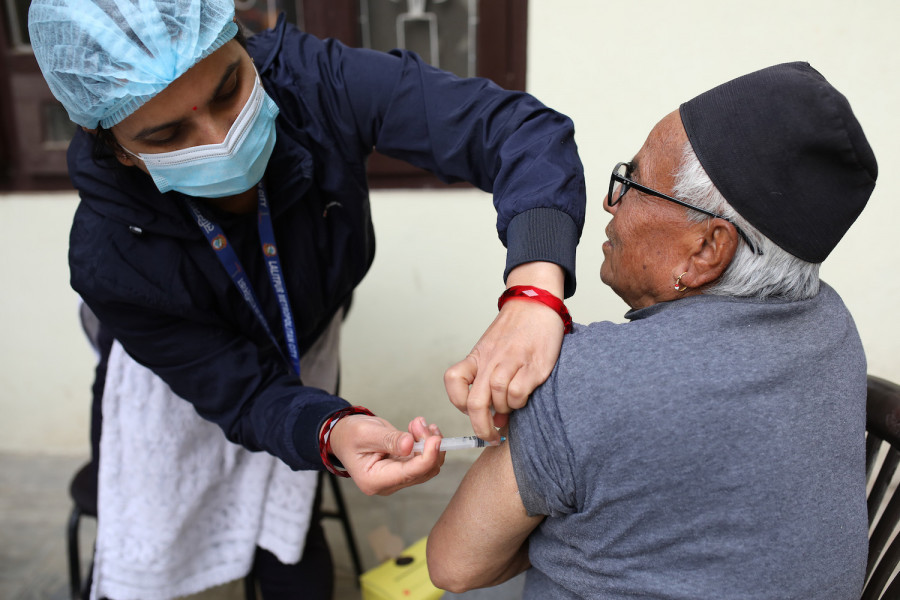Health
Government decides to widen dose gap for Covishield vaccine
Officials admit they are unsure about availability of booster doses even after the deadline extension.
Prithvi Man Shrestha
Amid uncertainty over when the country would get the Covishield vaccine from Serum Institute of India to give second doses to the eldery population, the government has decided to widen the gap between the first and second doses of the vaccine.
Over 1.3 million people aged above 65 had taken their first doses of the vaccine from March 7 to March 15. They were supposed to get the booster dose eight to 12 weeks after the first dose. This means, they should have taken the second jabs by June 6.
Dr Roshan Pokharel, chief specialist at the Ministry of Health and Population, said at a press meet on Monday that the government had decided to widen the gap to 12-16 weeks in line with the Indian government’s decision.
“India has issued new guidelines increasing the gap to 12-16 weeks and we are also moving to adopt the same. The process of vaccination will move forward accordingly,” Dr Pokharel said.
With the extension of the deadline, 1.3 million people over 65-years would have to take their booster shots between June 27 and July 5.
On May 13, the Indian government, amid an acute shortage of vaccines, had decided to increase the gap between the two doses of the AstraZeneca vaccine from 8-12 weeks to 12-16 weeks.
According to the Mint newspaper, the decision was based on “real-world data from the United Kingdom which showed that the vaccine was 65-88 percent effective if the interval was three months or more.”
But, Nepali officials are not sure whether the vaccine would be available even within the extended deadline. Last week, the Serum Institute said it could resume export of the Covishield vaccine only by the end of this year. The COVAX, an international vaccine-sharing scheme backed by the United Nations, has requested Nepal to look for options other than Covishield. With Serum dragging its feet, COVAX was the country's one immediate hope.
Given the context, Dr Pokharel told the Post that there was no guarantee whether vaccines would be available for the booster doses even by extended deadline.
Dr Shyam Raj Upreti, coordinator of the Covid-19 Vaccine Advisory Committee, told the Post that there was no other alternative except trying other sources for Covishield or other Astrazeneca-type vaccines.
On May 17, the US government announced that it would share 80 million doses including 60 million doses of the AstraZeneca type vaccine to help countries battling the pandemic, by the end of June 2021. By being the early receiver of AstraZeneca vaccine from the US, Nepal can meet the extended deadline provided the US starts distributing the vaccine on the announced date.
Foreign Minister Pradeep Gyawali told the Post last week that the government had requested countries including the United States and the United Kingdom to share their surplus AstraZeneca vaccines with Nepal so that the country could at least fully inoculate the elderly population that has received the first dose.
He said the government has also made requests to Serum and other companies which produce the AstraZeneca type vaccine. Failure to give booster doses could expose elderly people to the risk of infection.
A new UK government research suggests two doses of the Covid-19 vaccine are essential to provide strong protection against symptomatic infection from the coronavirus variant first identified in India, according to a report published in the Financial Times.
Two vaccine doses provided 81 percent protection against the B.1.617.2 variant first identified in India, and 87 percent against the B.1.1.7 strain first found in England, according to the Public Health England data.
The data showed that one dose offered 33 percent protection against symptomatic infection from B.1.617.2 and 51 percent against B.1.1.7, suggesting vulnerability for only using a single dose.
Referring to the World Health Organization, Dr Pokharel said at the press meet that a single dose also gives protection. “Two doses give more safety,” he added.




 17.12°C Kathmandu
17.12°C Kathmandu















